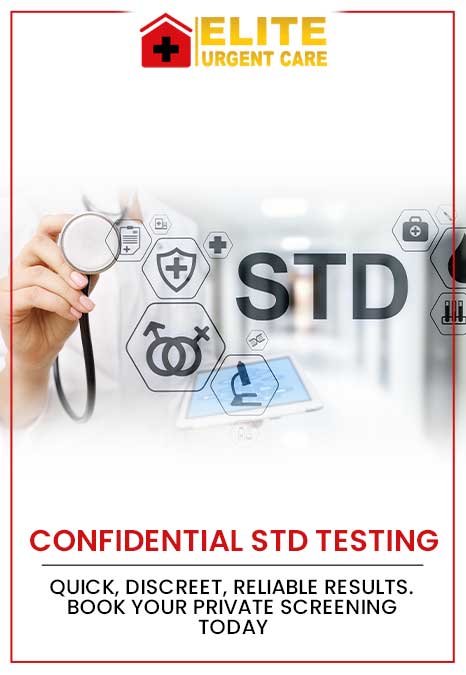Confidential STD Screening and Treatment Clinic Q&A
STD screening is important, as often patients may contract an STD without displaying any symptoms. If left untreated, STDs may spread and lead to worsening health outcomes. An STI can cause unusual discharge from the vagina or anus, pain when passing urine, lumps or skin growths around the genitals or bottom (anus), a rash, unusual vaginal bleeding, itchy genitals or anus, blisters and sores around your genitals or anus, and warts around your genitals or anus. Visit Dr. Nasseri, MD, and his qualified team for STD screening and treatments at Elite Urgent Care. For more information, contact us today or book an appointment online. We are conveniently located at 6100 Dobbin Rd, Suite A Columbia, MD 21045.




Table of Contents:
What is a full screening for STDs?
What are the three ways an STD test can be performed?
What happens if an STD goes untreated?
What’s the most common STD?
You may have questions about when to get tested for sexually transmitted diseases (STDs) if you’re sexually active, especially if you have multiple partners.
You can have an STD without knowing it, which is why getting tested is important. It is common for symptoms to be absent in many cases. Because you can have an infection without showing any symptoms, many experts prefer the term sexually transmitted infections (STIs).
There is no pain associated with STD testing, and it is quick and easy. Each STD has its test, so there is no single test for all STDs. You can discuss which tests you need with your doctor. A full screening may include a urine test, a cheek swab, a physical exam, and a blood test. Your sores may also be tested, as applicable, through the extraction of a sample fluid. A swab may be used to take cell samples from a potentially infected area, such as the genitals, as well. An STD panel may also be conducted.
Physical examinations and other tests can be used to diagnose some STIs, including herpes and genital warts. Sores, bumps, and other signs of STIs can be found during a physical exam by your doctor. Alternatively, samples can be taken from any questionable areas for testing in a laboratory. If you notice any changes on or around your genitals, you must let your doctor know. Any changes on or around your anus or rectum should also be reported if you have anal sex.
Urine or blood samples can be used to test for most STIs. Urine and blood tests can be less accurate than other forms of testing in some cases. Certain STIs may also take a month or more to be detected by blood tests after exposure. Still, they can be an effective option to check for gonorrhea, HIV, syphilis, and chlamydia.
Checking for STIs is often done with the use of a vaginal, cervical, or urethral swab. In a pelvic exam, your doctor can take swabs from your vagina and cervical region using a cotton applicator. The urethral swabs are taken by inserting a cotton applicator into the urethra of someone who has a vagina or penis. To check for infectious organisms in your rectum, they may also take a rectal swab.
You may have questions about when to get tested for sexually transmitted diseases (STDs) if you’re sexually active, especially if you have multiple partners.
You can have an STD without knowing it, which is why getting tested is important. It is common for symptoms to be absent in many cases. Because you can have an infection without showing any symptoms, many experts prefer the term sexually transmitted infections (STIs).
There is no pain associated with STD testing, and it is quick and easy. Each STD has its test, so there is no single test for all STDs. You can discuss which tests you need with your doctor. A full screening may include a urine test, a cheek swab, a physical exam, and a blood test. Your sores may also be tested, as applicable, through the extraction of a sample fluid. A swab may be used to take cell samples from a potentially infected area, such as the genitals, as well. An STD panel may also be conducted.
Physical examinations and other tests can be used to diagnose some STIs, including herpes and genital warts. Sores, bumps, and other signs of STIs can be found during a physical exam by your doctor. Alternatively, samples can be taken from any questionable areas for testing in a laboratory. If you notice any changes on or around your genitals, you must let your doctor know. Any changes on or around your anus or rectum should also be reported if you have anal sex.
Urine or blood samples can be used to test for most STIs. Urine and blood tests can be less accurate than other forms of testing in some cases. Certain STIs may also take a month or more to be detected by blood tests after exposure. Still, they can be an effective option to check for gonorrhea, HIV, syphilis, and chlamydia.
Checking for STIs is often done with the use of a vaginal, cervical, or urethral swab. In a pelvic exam, your doctor can take swabs from your vagina and cervical region using a cotton applicator. The urethral swabs are taken by inserting a cotton applicator into the urethra of someone who has a vagina or penis. To check for infectious organisms in your rectum, they may also take a rectal swab.
You are more likely to spread an untreated STI to others if you do not treat it. Using condoms and practicing safer sex does not eliminate the risk of transmission.
Women and men can become infertile if curable STIs like chlamydia and gonorrhea go untreated. Syphilis complications can also cause obstructions in the epididymis, increasing the risk of infertility in men.
In addition to dangers to a pregnant woman, many STIs can also pose a threat to an unborn child. You may be unable to carry your baby to term because of an infection, but the infection may also be transmitted to your baby during or before delivery.
HIV infection is more likely to occur if you have certain STIs such as herpes and syphilis, which cause open sores. This virus causes open sores which allow the HIV to easily enter the body.
It is important to treat STIs since it is possible to develop severe and sometimes life-altering complications over time. In some cases, these conditions may progress undetected for years without showing any visible symptoms.
Among STDs, HPV is the most common. A CDC study estimates that nearly 80 million Americans, including 14 million teenagers, are infected with HPV.
Most people do not experience any symptoms of this infection, but some may have warts on their genitals, mouths, or throats. Cervical and oral cancers can be caused by certain types of HPV.
STD screening and treatment are available at Elite Urgent Care. For more information, contact us or request an appointment online. We are conveniently located at 6100 Dobbin Rd, Suite A Columbia, MD 21045. We serve patients from Columbia MD, Elkridge MD, Ellicott City MD, Laurel MD, Clarksville MD, Fulton MD, Jessup MD, and surrounding areas.
Check Out Our 5 Star Reviews









